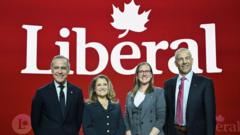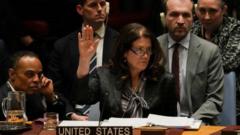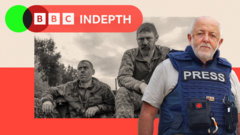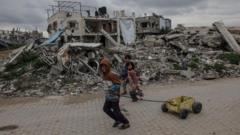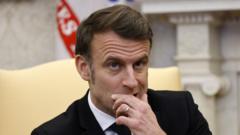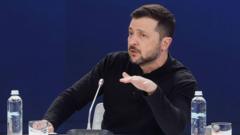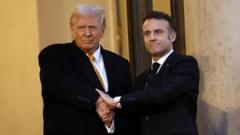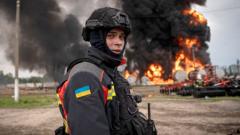Following discussions with Donald Trump, French President Emmanuel Macron indicated that negotiations for a potential truce between Ukraine and Russia could materialize in the near future. Both leaders highlighted the need for security guarantees and a fair distribution of peacekeeping responsibilities, as well as the importance of avoiding any agreements that might amount to Ukrainian capitulation.
Macron Optimistic on Imminent Truce in Ukraine Conflict
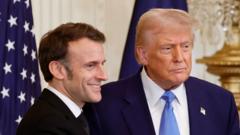
Macron Optimistic on Imminent Truce in Ukraine Conflict
French President Emmanuel Macron expresses hope for a ceasefire between Ukraine and Russia within weeks during talks with Donald Trump at the White House.
French President Emmanuel Macron recently shared his optimism regarding a potential truce between Ukraine and Russia, stating that an agreement could be reached in the coming weeks. Speaking to Fox News during a visit to the White House, where he met with former President Donald Trump, Macron emphasized that any resolution must not equate to a "surrender of Ukraine," and would need to be accompanied by robust security guarantees.
Macron's remarks come at a significant time, marking the third anniversary of Russia's invasion of Ukraine, with the US president suggesting that the war could conclude swiftly. Trump insisted that European nations should bear the majority of the financial and logistical burdens associated with any peacekeeping initiatives for Ukraine.
The French president pointed out that he has consulted with numerous European leaders, many of whom are open to participating in security guarantees for Ukraine. He and British Prime Minister Sir Keir Starmer are reportedly developing a proposal to dispatch troops to certain locations in Ukraine, but these forces would not be engaged in frontline combat. Rather, their mission would be to ensure that peace accords are maintained, bolstered by backing from the US.
In alignment with ongoing negotiations surrounding critical mineral deals between the US and Ukraine, Macron stressed the importance of obtaining a commitment from the US regarding Ukrainian sovereignty. Furthermore, during the press conference following their meeting, both Trump and Macron agreed that any peace agreement should involve the deployment of European peacekeeping forces, an idea that Russia has firmly rejected.
Macron praised Trump's recent discussions with Russian President Vladimir Putin and expressed confidence that this engagement would contribute to a future dialogue to end the conflict. Trump, meanwhile, reiterated his intention to visit Russia once a ceasefire is established but refrained from labeling Putin as a dictator, indicating a nuanced approach to diplomatic relations.
Despite a seemingly congenial atmosphere, Macron notably countered Trump's characterization of EU support for Ukraine, stating that Europe has contributed significantly, covering around 60% of the total aid. While the two leaders found some common ground, differing perspectives on the roles and responsibilities of Europe and the US in securing peace remained apparent.
As the conversation around the Ukraine conflict evolves, recent developments show a shift in Washington's stance on the issue, marked by a US-drafted resolution that maintained a neutral position and was supported by Russia. This resolution, however, saw France and the UK abstaining from the vote.
As discussions continue within various international forums, including high-level addresses from global leaders, the desire for quick resolution remains on the table, but the path towards a sustainable and equitable peace reflects deeper complexities in international relations surrounding the conflict in Ukraine.


